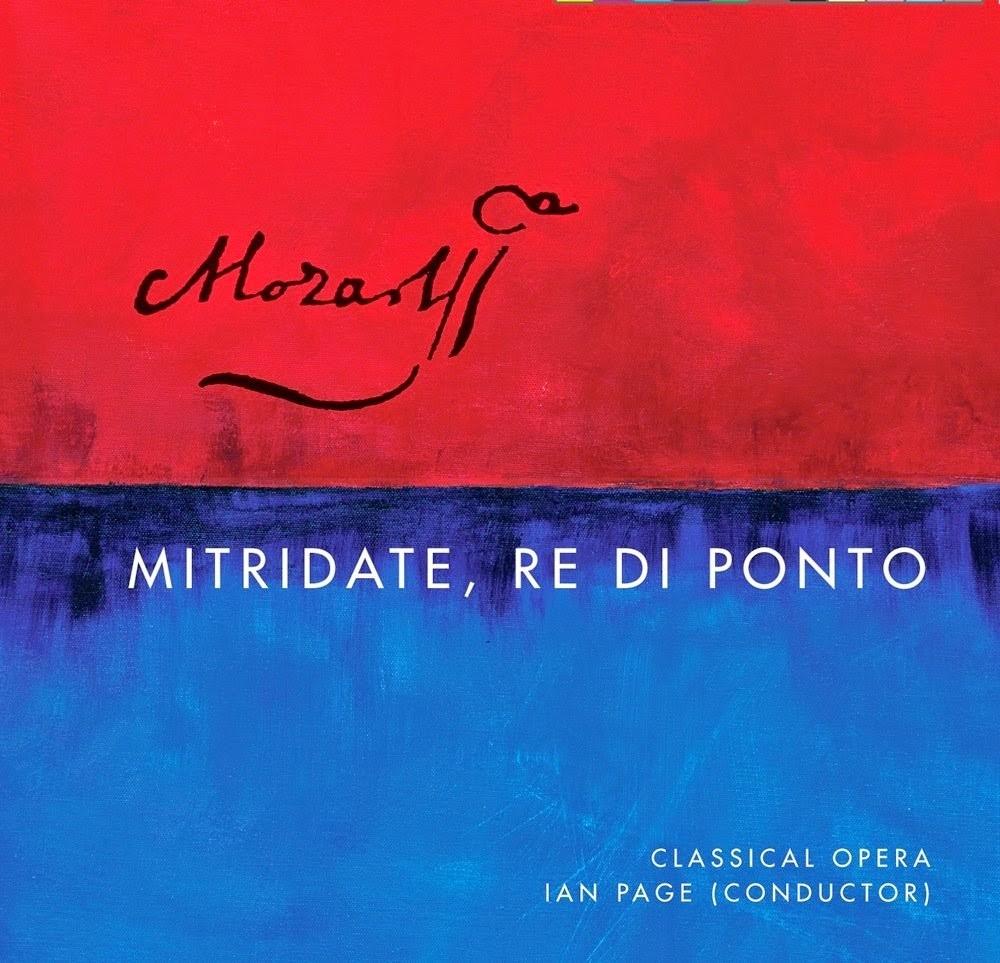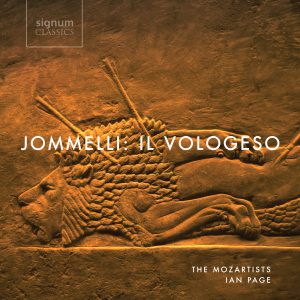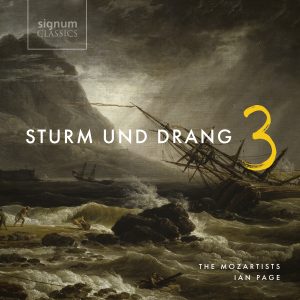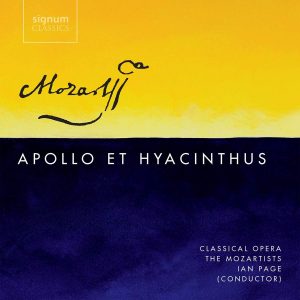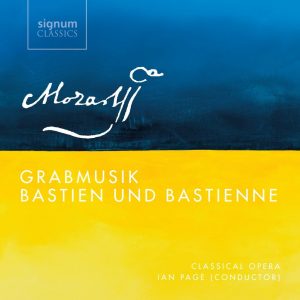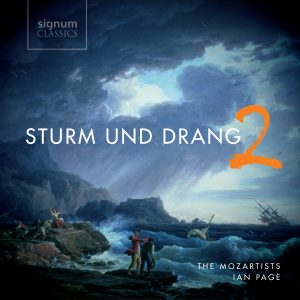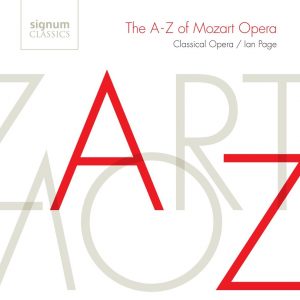“Classical Opera’s achievement is at least the equal of any version hithero in the opera’s distinguished discography.”
GRAMOPHONE
The third work in Classical Opera’s complete Mozart Opera recording cycle is Mitridate, re di Ponto. It was composed for the Teatro Regio Ducale in Milan in 1770, when Mozart was only fourteen, and was the composer’s first venture into ‘opera seria’. Despite a difficult rehearsal period, during which Mozart was required to rewrite several numbers, the première was a great success, and marked the first operatic triumph of the young composer’s fledgling career.
Classical Opera’s new set is the first recording of the work to include in an appendix Mozart’s original settings of the seven arias and a duet which he rewrote before the opera’s first performance, and it features an outstanding cast headed by Miah Persson, Barry Banks, Sophie Bevan and Lawrence Zazzo.
To order your copy, please click the ‘Add to cart’ button or download a digital version from one of the sites below:
Classical Opera: Making of Mitridate from TallWall Media on Vimeo.
CD 1
- Overture – I. Allegro 2:03
- Overture – II. Andante grazioso 1:48
- Overture – III. Presto 1:23
- ATTO PRIMO Recitativo: “Vieni Signor” (Arbate, Sifare) 1:49
- Recitativo: “Se a me s’unisce Arbate” (Sifare, Aspasia) 2:40
- No.1, Aria: “Al destin, che la minaccia” (Aspasia) 6:40
- Recitativo accompagnato: “Qual tumulto nell’alma” (Sifare) 1:06
- No.2, Aria: “Soffre il mio cor con pace” (Sifare) 7:35
- Recitativo: “Sin a quando, o Regina” (Farnace, Aspasia) 1:22
- Recitativo: “Ferma, o germano” (Sifare, Farnace, Aspasia) 0:48
- Recitativo: “All’ire freno, Principi, olà” (Arbate, Sifare, Farnace) 0:33
- No.3, Aria: “L’odio nel cor frenate” (Arbate) 3:42
- Recitativo: “Principe, che facemmol” (Farnace, Sifare, Aspasia) 0:13
- No.4, Aria: “Nel sen mi palpita” (Aspasia) 2:22
- Recitativo: “Un tale addio, germano” (Farnace, Sifare) 1:10
- No.5, Aria: “Parto: Nel gran cimento” (Sifare) 3:57
- Recitativo: “Eccovi in un momento sconvolti” (Farnace, Marzio) 1:01
- No.6, Aria: “Venga pur, minacci e frema” (Farnace) 7:14
- No.7, Marcia: Maestoso 2:45
- No.8, Cavata: “Se di lauri il crine adorno” (Mitridate) 4:42
- Recitativo: “Tu mi rivedi, Arbate” (Mitridate, Ismene, Arbate) 0:56
- Recitativo: “Su la temuta destra” (Sifare, Mitridate, Farnace, Ismene) 2:06
- No.9, Aria: “In faccia all’oggetto” (Ismene) 5:45
- Recitativo: “Teme Ismene a ragion” (Mitridate, Arbate) 2:29
- Recitativo accompagnato: “Respira alfin, respira” (Mitridate) 1:51
- No.10, Aria: “Quel ribelle e quell’ingrato” (Mitridate) 3:10
CD 2
- ATTO SECONDO Recitativo: “Questo é l’amor, Farnace” (Ismene, Farnace) 1:55
- No. 11, Aria: “Va, l’error mio palesa” (Farnace) 2:43
- Recitativo: “Perfido, ascolta” (Ismene, Mitridate) 0:54
- Recitativo: “Eccomi a cenni tuoi” (Aspasia, Mitridate) 2:05
- Recitativo: “(Respiro, oh Dei!)” (Aspasia, Sifare, Mitridate) 0:37
- No.12, Aria: “Tu che fedel mi sei” (Mitridate) 3:50
- Recitativo: “Che diro? Che ascoltai?” (Sifare, Aspasia) 1:14
- Recitativo: “Alla tua fede il padre, Sifare, applaude” (Arbate) 0:32
- Recitativo: “Oh giorno di dolore!” (Aspasia, Sifare) 1:58
- Recitativo accompagnato: “Non più, Regina” (Sifare, Aspasia) 1:58
- No.13, Aria: “Lungi da te, mio bene” (Sifare) 2:26
- Recitativo accompagnato: “Grazie ai Numi partì” (Aspasia) 1:28
- No.14, Aria: “Nel grave tormento” (Aspasia) 4:11
- Recitativo: “Qui, dove la vendetta si prepara” (Mitridate, Ismene, Arbate) 0:54
- Recitativo: “Sedete, o Prenci” (Mitridate, Sifare, Farnace) 2:36
- Recitativo: “Signor, son io” (Marzio, Mitridate, Sifare) 0:48
- Recitativo: “Inclita Ismene” (Mitridate, Ismene) 0:18
- No.15, Aria: “So quanto a te dispiace” (Ismene) 5:43
- Recitativo: “Ah, giacch è son tradito” (Farnace) 0:35
- No.16, Aria: “Son reo; l’error confesso” (Farnace) 2:48
- Recitativo: “E crederai, Signor” (Sifare, Mitridate, Aspasia) 4:04
- No.17, Aria: “Già di pietà mi spoglio” (Mitridate) 2:14
- Recitativo: “Sifare, per pietà stringi l’acciaro” (Aspasia, Sifare) 1:22
- Recitativo accompagnato: “Io sposa di quel mostro” (Aspasia, Sifare) 1:38
- No.18, Duetto: “Se viver non degg’io” (Sifare, Aspasia) 6:21
CD 3
- ATTO TERZO Recitativo: “Pera omai chi m’oltraggia” (Mitridate, Aspasia, Ismene) 1:55
- No.19, Aria: “Tu sai per chi m’accese” (Ismene) 4:33
- Recitativo: “Re crudel, Re spietato” (Aspasia, Mitridate) 2:02
- Recitativo: “Mio Re, t’affretta” (Arbate, Mitridate) 0:40
- No.20, Aria: “Vado incontro al fato estremo” (Mitridate) 2:56
- Recitativo: “Lagrime intempestive” (Aspasia)0:29
- Recitativo accompagnato: “Ah ben ne fui presaga!” (Aspasia) 1:20
- No.21, Cavatina: “Pallid’ ombre, che scorgete” (Aspasia) 3:54
- Recitativo accompagnato: “Bevasi… Ahimè” (Aspasia) 1:24
- Recitativo: “Che fai, Regina?” (Sifare, Aspasia) 1:09
- Recitativo: “Che mi val questa vita” (Sifare) 0:40
- No.22, Aria: “Se il rigor d’ingrata sorte” (Sifare) 2:42
- Recitativo: “Sorte crudel, stelle inimiche” (Farnace) 0:46
- Recitativo: “Teco i patti, o Farnace” (Marzio, Farnace) 1:41
- No.23, Aria: “Se di regnar sei vago” (Marzio) 4:13
- Recitativo accompagnato: “Vadasi… Oh ciel” (Farnace) 1:04
- No.24, Aria: “Già dagli occhi il velo è tolto” (Farnace) 8:31
- Recitativo: “Figlio, amico, non più” (Mitridate, Sifare) 1:30
- Recitativo: “Ah vieni, o dolce dell’amor mio” (Mitridate, Aspasia, Sifare) 1:23
- Recitativo: “Reo non si chiami, o Sire” (Ismene, Mitridate) 1:23
- No.25, Coro: “Non si ceda al Campidoglio” (Aspasia, Sifare, Farnace, Ismene, Arbate) 0:53
- THE ORIGINAL VERSIONS No.1, Aria: “Al destin che la minaccia” (Aspasia) 6:54
- No.8, Cavata: “Se di lauri il crine adorno” (Mitridate) [completion by Sadie/Page] 3:55
- No.9, Aria: “In faccia all’oggetto” (Ismene) 4:36
- No.13, Aria: “Lungi da te, mio bene” (Sifare) 9:38
- No.14, Aria: “Nel grave tormento” (Aspasia) [completion by Sadie] 5:14
- No.16, Aria: “Son reo; l’error confesso” (Farnace) 5:04
- No.18, Duetto: “Se viver non degg’io” (Aspasia, Sifare) 7:54
- No.20, Aria: “Vado incontro al fato estremo” (Mitridate) 2:37
The opera is set in the royal port of Nymphaea, in the Crimea, in c.63 BC. Mitridate is the King of Pontus, a Hellenic kingdom on the southern shores of the Black Sea, and has been engaged in battle against the Roman General Pompei. He has left his elder son Farnace in command of Pontus while his younger son Sifare watches over the Caucasian outpost of Colchis. News has now spread, though, that Mitridate has been killed in battle during a heavy defeat to the Romans, and both sons have abandoned their duties to come to Nymphaea, where Mitridate’s fiancée Aspasia has been awaiting his return.
Act One
The town square of Nymphaea
Arbate, the city’s governor, welcomes Sifare to Nymphaea. Sifare expresses concern that Farnace is already there, and confides to Arbate that both brothers are in love with Aspasia; furthermore, Farnace is suspected of being in league with the Romans. Aspasia rushes in and asks Sifare to shield her from Farnace’s aggressive advances; Encouraged that Aspasia has turned to him for support, Sifare declares his love and vows to protect her.
The Temple of Venus
Aspasia repels Farnace’s lustful pursuit of her, and when he threatens violence Sifare arrives to defend her. Just as the brothers are about to come to blows, Arbate brings news that Mitridate is alive and well, and is approaching the city. Farnace fails to persuade Sifare to unite with him against their father, but they agree to keep quiet about their rivalry for Aspasia. When Sifare leaves, Farnace conspires with the Roman tribune Marzio to salvage his plan to assume the throne.
The port of Nymphaea
Mitridate arrives with his fleet and comes ashore, defeated but proud. To Farnace’s dismay he has brought with him Ismene, daughter of the King of Parthia and Farnace’s promised bride; Ismene is disconcerted by Farnace’s cold attitude towards her. Mitridate orders his two sons to escort Ismene to the royal palace. Meanwhile he explains to Arbate that he himself had spread the news of his death to test his sons’ loyalty. Arbate informs him that Farnace has made improper advances to Aspasia, but claims that Sifare has displayed no feelings towards her. Mitridate is greatly relieved that his favoured son has seemingly shown himself to be worthy, but vows revenge on Farnace.
Act Two
The royal apartments
Farnace tells Ismene that he no longer loves her, and warns her that if she appeals to Mitridate she may regret the consequences; by now, though, Mitridate believes that Sifare would make a more suitable husband for her.
Mitridate tells Aspasia that he wants to marry her immediately. When she hesitates he accuses her of being in love with Farnace; he summons Sifare to deal with the treachery. Left alone, Sifare and Aspasia declare their love for each other, but duty and honour dictate that they must suppress it.
Mitridate’s camp
Mitridate exposes Farnace as a traitor. Farnace confesses his alliance with the Romans, but betrays Sifare’s love for Aspasia. Mitridate tricks Aspasia into confessing her feelings for Sifare, and furiously condemns her and both of his sons to death. Sifare and Aspasia resolve to die together.
Act Three
The hanging gardens
Ismene begs Mitridate to be merciful. He offers to spare Aspasia if she will return to him, but she angrily rejects him and prepares to die. Mitridate, meanwhile, receives news that the Romans are laying siege to the city walls, and he sets off to fight them. Sifare, who has been rescued by Ismene, now rescues Aspasia and departs to fight by his father’s side.
The interior of a tower adjoining the walls of Nymphaea
During the Roman attack Marzio helps Farnace to escape, but Farnace renounces his previous ambitions, joining the battle but then setting fire to the Roman fleet.
A hall adjoining a grand courtyard in the palace of Nymphaea
Mitridate is carried in, having mortally wounded himself rather than surrendering to the Romans. Before he dies he is reconciled with his sons; he unites Aspasia with Sifare and forgives Farnace, who is in turn reconciled with Ismene.
The German – English libretto for Mitridate, re di Ponto can be found here.
Mitridate, re di Ponto – an introduction by Ian Page
Mitridate, re di Ponto was premièred at the Teatro Regio Ducale in Milan on 26 December 1770. It marked the culmination of Mozart’s first trip to Italy, and represented the first great operatic success for a composer still a month short of his fifteenth birthday. The work received an initial run of twenty-two performances – sure proof of its success – and news quickly spread of the child’s astonishing work.
But the preparations for the opera had been far from smooth. The idea of Milan’s opera season opening with a work by a fourteen-year-old German attracted widespread suspicion – even more on account of his nationality, it seems, than his age – and many of the original cast insisted that Mozart rewrite their arias to their own specifications and wishes. He was too young and inexperienced to stand his ground (a decade later he was quite able to defend himself against similar intrigues when writing Idomeneo), and so he complied with their demands. Mozart’s eight jettisoned numbers (seven arias and a duet) have all survived, though, and this is the first recording of Mitridate to include all of these original settings as well as the final versions.
Background
Between December 1769 and January 1773 Mozart travelled to Italy three times. On each occasion he was accompanied by his father Leopold, and each visit culminated in the completion and first performance of a new opera for the Teatro Regio Ducale in Milan – Mitridate, re di Ponto in 1770, Ascanio in Alba in 1771, and finally Lucio Silla in 1772. These trips were also of considerable educational importance, for as well as meeting some of the foremost composers of the day, including Hasse, Piccinni and Jommelli, Mozart was also able to attend a large number of operas, including works by such composers as Paisiello, Guglielmi, Valentini and Pugnani.
After his ‘Grand Tour’ of 1763-6, which incorporated extended stays in Paris and London, and two visits to Vienna, the second of which saw the composition of La finta semplice and Bastien und Bastienne, Mozart was already a seasoned traveller; indeed, during the ten formative years between the ages of seven and seventeen he was to spend less than three years in total at home in Salzburg. While the second and third visits to Italy were of relatively short duration, the first trip was an extensive tour lasting for more than fifteen months, and including triumphant performances in Verona, Mantua, Milan, Bologna, Florence, Rome and Naples.
Italy was still very much the centre of the operatic world, and a composer’s education was not considered complete until he had spent time there; Handel, Gluck and Johann Christian Bach had all studied opera in Italy in their youth, and Archbishop Schrattenbach, the Mozarts’ employer in Salzburg, had already sent several of his court musicians there to further their studies, so that they might then be better equipped to increase the quality of Salzburg’s musical life. Schrattenbach was quick to recognise Mozart’s potential to enhance the reputation of Salzburg abroad, and in November 1769 he made the departing father and son an extravagant gift of 600 florins and bestowed on the thirteen-year-old Wolfgang the title of ‘Konzertmeister’. The post was to be unpaid until such time as the young composer returned to his duties in Salzburg, but the appointment was a politic move not only to increase Mozart’s reputation in Italy but also to retain his loyalty and allegiance to Salzburg.
The commission
Wolfgang and his father arrived in Italy just before Christmas 1769, passing through Rovereto, Verona, Mantua and Cremona before arriving in Milan on 23 January 1770. At the time Italy was not a unified nation but a series of separate states, many of which were under Austrian rule, and although Milan was governed by Empress Maria Theresa’s son, Archduke Ferdinand, much of the power effectively rested with her viceroy in Northern Italy, Count Firmian. He was a respected patron of the arts, and as the director of the Teatro Regio Ducale, it was he who suggested that the young Wolfgang be invited to write the opening opera of Milan’s 1770-71 season. To offer such an important commission to such a young and inexperienced composer was bound to prompt suspicion and distrust, though, and so Firmian, by way of audition, set up a public concert for the young prodigy on 12 March; one hundred and fifty nobles were gathered for the occasion, and Mozart was required to compose three new arias to texts from Metastasio’s Demofoonte to prove his credentials.
He clearly passed with flying colours, for three days later he and his father left Milan with the new contract safely secured. Over the next seven months they spent time in Bologna, where Wolfgang studied composition and counterpoint with the great pedagogue Padre Martini, in Florence, where Mozart’s father was mesmerised by the beauty of the city and its surroundings, in Rome, where Wolfgang reportedly wrote out Allegri’s Miserere from memory after hearing a performance in the Sistine Chapel, and in Naples, from where they visited Pompeii, which had only started to be excavated as recently as 1755. Meanwhile Pope Clement XIV made Wolfgang a ‘Knight of the Golden Order’, a higher rank than that which had previously been awarded to Gluck.
The libretto
Leopold wrote from Rome in June 1770 that Mozart’s new opera for Milan was to be a setting of Metastasio’s La Nitteti, but a few weeks later, on 27 July, Mozart received official notification that he was to set Mitridate, re di Ponto, based on a superb tragedy by Racine. The libretto, adapted by Vittorio Cigna-Santi from an Italian translation of the original French play, had already been set by the composer Quirino Gasparini for performance in Turin in 1767, and this provided a degree of security for the authorities – presumably they had in the back of their minds that if Mozart’s setting proved insufficiently accomplished they could always replace it with Gasparini’s Mitridate, a perfectly respectable work which had not been heard before in Milan.
The title character is based on the real-life King Mithridates VI (c.120 – 63 BC), also known as Mithridates Eupator or Mithridates the Great, who was famed for his military defiance of the Romans (he engaged in three extensive wars against them, lasting for a total of almost twenty years) and for his cultivation of an antidote to poison. According to Pliny the Elder’s account he could speak the languages of all the twenty-two nations that he governed, and his son Pharnaces led a rebellion that caused his eventual demise. Racine, though, was far less concerned with historical accuracy than the emotional tensions and conflicts between a father and two sons who all love the same woman.
Cigna-Santi’s adaption removes two minor characters from Racine’s cast, but adds the roles of Ismene and Marzio. It also introduces Farnace’s final transformation, thereby ensuring the happy ending that was virtually obligatory for opera seria (Racine’s Pharnaces had remained unrepentant at the end of the play, fleeing with the defeated Romans).
Composition and first performance
If Leopold Mozart’s letters are to be believed Wolfgang did not start work on Mitridate until 29 September, when he and his father were in Bologna, and after he returned to Milan on 18 October he wrote home to his mother: “I cannot write much for my fingers ache badly from composing no end of recitative.” This reflects the standard procedure of the time, whereby the composer wrote all of the recitatives, followed by any choruses and ensembles, before embarking on the arias; these were made to measure, like a good suit, once the composer had met and started working with the singers.
The role of Mitridate was to be sung by the tenor Guglielmo d’Ettore, who had created the title role in Gasparini’s setting three years earlier, and that of Aspasia by the acclaimed soprano Antonia Bernasconi; the roles of Sifare and Farnace, Mitridate’s two sons, were taken by two castrati, Pietro Benedetti and Giuseppe Cicognani. Ismene and Marzio were sung by Anna Francesca Varese and Gasparo Bassano respectively, and the Arbate was a third castrato, Pietro Muschietti (being an opera seria, this was the first of Mozart’s stage works to employ castrati). As was the custom of the day, the singers assembled in Milan gradually (the less well-known singers first, because their time was less expensive, although Bernasconi was already in Milan and so started working with Mozart earlier).
The process was not without its trials, however. Understandably excited to have earned such an important commission, it seems that Mozart had already written several of the arias before getting together with the cast, and the singers – no doubt wary of his inexperience and eager to assert their own authority – insisted on various rewrites. Guglielmo d’Ettore proved particularly troublesome and hard to please – four different sketches survive for Mitridate’s opening aria, “Se di lauri il crine adorno”, each quite different from the final version. He seems to have been suffering at the time from severe vocal limitations, which Mozart’s music needed to conceal or avoid, and indeed he was to die the following year at a mere thirty-one years of age. He also rejected Mozart’s setting of Mitridate’s final aria, “Vado incontro al fato estremo”, replacing it with Gasparini’s version, and the collaboration was clearly not a happy one for the young composer; Leopold Mozart, when writing to his son several years later, offered him the following advice: “You must not allow any envious persons to get the better of you or upset you. It happens everywhere – think only of Italy, of your first opera there, of d’Ettore”.
But d’Ettore was not the only cast member who proved problematic. An anonymous enemy, perhaps part of the inevitable faction that believed a German had no place writing operas for Italy, soon tried to persuade the prima donna Bernasconi to insert Gasparini’s arias into the new score, and all five of the singers who had more than one aria required rewrites. Wolfgang seems to have been a model of patience, and Bernasconi was entirely won over by the music he wrote for her, but as the first performance approached he and his father continued to fear cries of “troppo tedesco” (“too German”).
In the event, however, the opera’s premiére was a major triumph, and a thrilled Leopold wrote home: “God be praised, the first performance of the opera took place on the 26th and won general applause; and two things that have never happened before in Milan occurred. Firstly, contrary to all the customs of a first night, an aria of the prima donna was encored . . . and secondly, after almost all the arias there was extraordinary applause and cries of ‘Viva il Maestro! Viva il Maestrino!’”.
The music
Throughout his operatic career Mozart displayed an unerring ability to create music of a scale and ambition commensurate with the occasion for which it was written. The Teatro Regio Ducale was a large and magnificent venue, and the opening of the opera season a prestigious social occasion. Despite all the tribulations, the cast was of a considerably higher quality than any he had previously worked with, as was the libretto, thanks mainly to the noble beauty and searing intensity of Racine’s original play. The orchestra too was larger than any he had so far written for – Leopold Mozart specified fifty-six players for the premiére of Mitridate – and this is reflected in the breadth and dynamism of the orchestral writing.
The vocal writing is of course full of the brilliance and virtuosity which was de rigeur for Milanese audiences, particularly in the opening arias and duet for Aspasia and Sifare, but the most remarkable and memorable elements of the score are the arias which mark the emotional peaks of the story, such as Sifare’s poignant “Lungi da te, mio bene”, Aspasia’s soulful “Pallid ombre” and Farnace’s final, redemptive “Già dagli occhi il velo é tolto”. In these the fourteen-year-old composer already transcends the very models he is trying to emulate, and taps into a depth and resonance of human experience which is staggering in one so young.
© Ian Page
Mitridate, King of Pontus — Barry Banks (tenor)
Aspasia, betrothed to Mitridate — Miah Persson (soprano)
Sifare, Mitridate’s younger brother — Sophie Bevan (soprano)
Farnace, Mitridate’s elder son — Lawrence Zazzo (countertenor)
Ismene, daughter of the King of Parthia — Klara Ek (soprano)
Marzio, a Roman tribune — Robert Murray (tenor)
Arbate, governor of Nymphaea — Anna Devin (soprano)
The Mozartists, Matthew Truscott (leader)
Continuo: Steven Devine (harpsichord), Andrew Skidmore (cello), Cecelia Bruggemeyer (double bass)
Horn solo: Gavin Edwards

